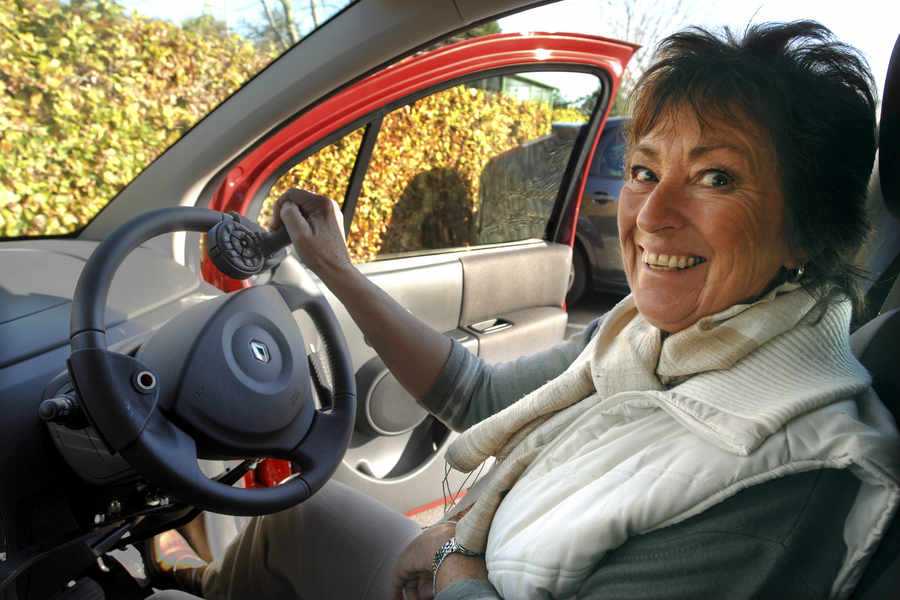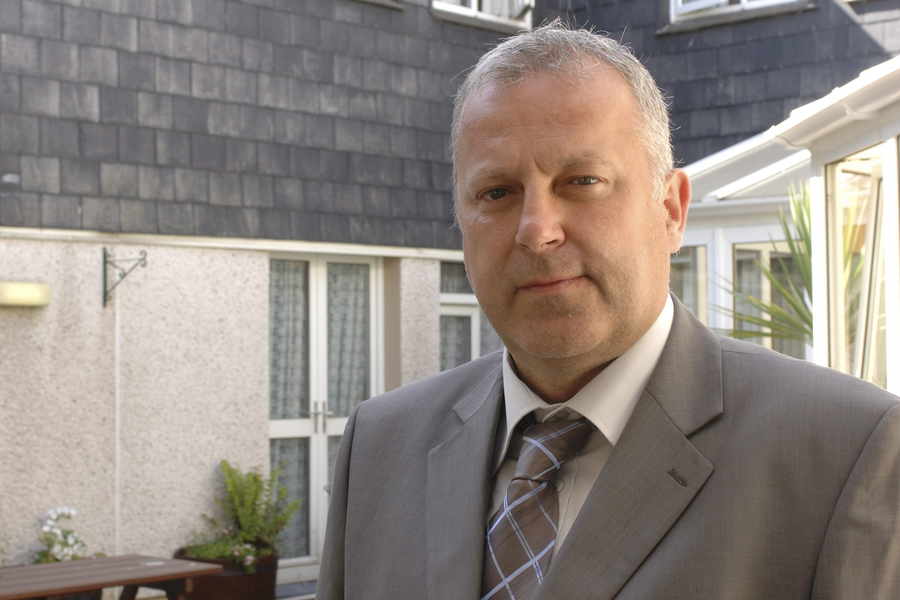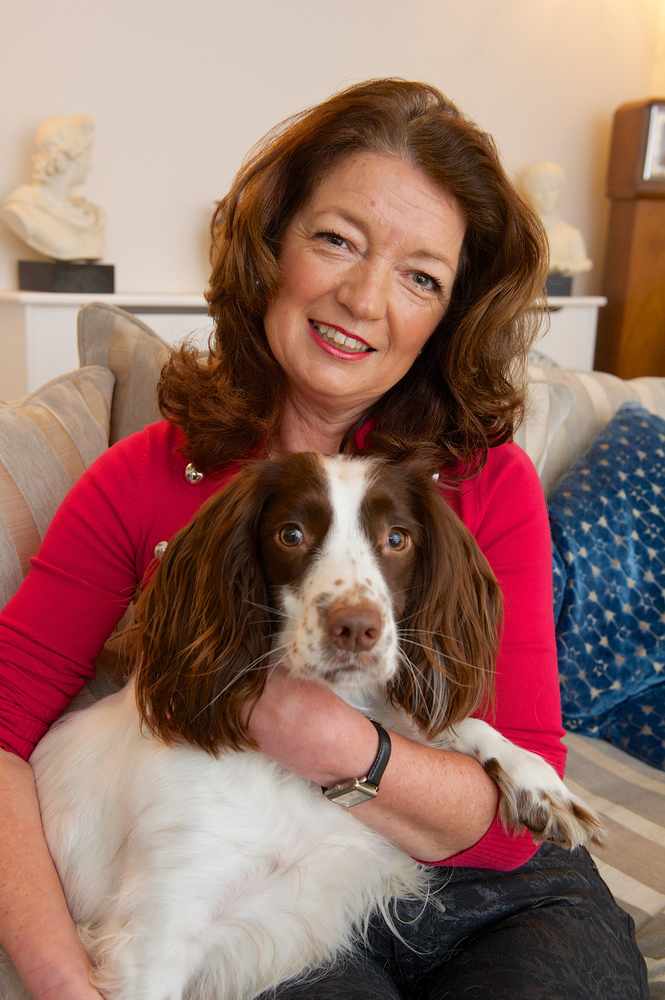- Health round-up
- Interviews with Islanders living with the effects of a stroke
- My Health feature with charity director
- Cancer support group widening its remit
To mark Action on Stroke Month, we speak to Islanders living with the effects of the condition
HAVE you noticed that buildings have been lit purple this month? Fort Regent, Mont Orgueil and the main hall at Victoria College have all been colourful in order to raise awareness for Action on Stroke Month.
There are an estimated 152,000 strokes in the UK every year and it is the leading cause of severe adult disability.
Tracy O’Regan, the community fundraising manager of Stroke Association Jersey, says: ‘First-time incidence of stroke occurs almost 17 million times a year worldwide. That’s roughly the equivalent of one every two seconds.
‘A stroke happens in an instant but its effects can last a lifetime.’
- Up to 80 per cent of all strokes could be prevented
- There are many factors that can increase your risk of stroke, including your genes, your age, your diet and how fit you are
- The amount of alcohol you drink and whether you smoke are also key factors, as is whether you have any other medical conditions, such as high blood pressure or diabetes mellitus
- Moderate exercise can reduce risk of stroke by up to 72 per cent
- Smoking doubles your risk of death from stroke
- Being overweight increases your risk of ischaemic stroke by 22 per cent, while being obese increases the risk by 64 per cent
Strokes occur when the blood supply to the brain is cut off, typically caused by a clot or bleeding in the brain.
They remain the fourth biggest killer in the UK and can affect any age group.
Shockingly, an estimated 200 babies suffer a stroke each year in the UK.
Health and Social Services statistics show that although Jersey compares well with the UK in terms of premature deaths (those under 75), strokes still cause around seven to eight per cent of all annual deaths. That’s around 50 a year.
The Stroke Association also strives to make people aware that, though always serious, strokes needn’t always be entirely life-destroying occurrences.
Or, as Tracy puts it: ‘We believe in life after stroke.’
Phil Wright, a former DJ at Sands nightclub, suffered a stroke nine years ago, aged just 52.
Although he has been paralysed down his right-hand side and his speech strained, Phil has nevertheless made considerable progress over the years, thanks in part to the Stroke Association.
Phil’s wife, Anne, said: ‘We have a fantastic volunteer called Maria who visits for regular one-on-one sessions.’
Phil says that his difficulty in communicating remains the most frustrating aspect of his condition.
‘Often Phil will say yes when he means no and vice versa,’ says Anne. ‘It’s funny, if he has to stop and think about a word, then he can’t pronounce it, whereas if it’s spontaneous, he’s as clear as a bell.’
- Stroke Association
- Driving for the Disabled: Call senior occupational therapist Amanda Johnson on 444803 or lead driving instructor Kerrie Dorrington on 865866.
- Jubilee Sailing Trust: Call 02380 426849.
Although Phil can’t remember anything from the day he suffered his stroke, for Anne the ‘horrendous’ memories are still fresh.
‘Phil had been active all morning,’ she says. ‘He’d made me a cup of coffee and been up in the loft and then he went outside for a smoke, and that was where I found him.
‘He was behind the outside door trying to get in, with a hand held to his head and making the most dreadful noise.
‘I realised right away that something was seriously wrong.’
There had been no sign that anything was amiss in the weeks and months before his stroke.
‘It was completely out of the blue,’ says Anne.
This was likely due to Phil suffering an aneurysm, which is a blood-filled balloon-like bulge that develops in the blood vessel walls.
IT IS vital that steps are taken immediately when a stroke occurs to minimise long-term damage.
The FAST Test identifies the three most common symptoms of a stroke or mini-stroke and the right action to take:
- FACE: Can the person smile? Has their mouth or eye drooped?
- ARM weakness: Can the person raise both arms?
- SPEECH problems: Can the person speak clearly and understand what you say?
- TIME to call 999.
As aneurysms increase in size, the risk of rupture increases, and this can lead to strokes and, in many cases, death.
‘If it’s a blood clot there are more likely to be warning signs,’ says Anne.
Following his stroke, Phil was transferred to Southampton for surgery, where he would remain for three weeks.
Returning to the Island, he then spent six months in Overdale Hospital where he underwent a year of physiotherapy and speech therapy.
Buckingham-born Phil – who has lived in Jersey since moving here with his family aged 11 – still struggles with many day-to-day activities, although he has retained his huge passion for music, with John Lennon a particular favourite.
‘We recently gave his old iPad to one of the grandchildren,’ says Anne. ‘They discovered bands like Gun and Roses and rang us to say, “This is the best music ever!”.’
Phil is also now able to drive, thanks to having had his car specially adapted.
‘Thanks to Driving for the Disabled, Phil was able to pass his test in Jersey,’ Anne said.
Driving for the Disabled is an independent charity set up by Pam Evans, who herself suffered a huge stroke which left her paralysed on her right-hand side.
‘After my stroke I was determined to drive,’ says Pam. ‘However, I had to go to a mobility centre in the UK in order to pass my test. It was expensive, stressful and exhausting.’

Pam raised money locally and purchased a car adapted to accommodate disabled drivers.
The business was set up shortly thereafter, since when more than 100 disabled drivers have been able to learn to drive on Jersey’s roads.
For Pam, the Jubilee Sailing Trust also played a key role in her post-stroke rehabilitation.
‘It’s a Southampton-based charity but with a strong Jersey branch,’ she says.
‘They have two ships, both of which are custom built to enable people with disabilities to play a part in sailing.’
Pam has now sailed with them four times, most recently on a trip from Antigua to Nassau.
‘I participate in everything, from hoisting sails and mess duties to being hauled up to the crow’s nest.
‘It has changed my life and given me the opportunity to meet some amazing people.’
Phil, meanwhile, is preparing to take part in the Stroke Association’s sponsored walk on Sunday 5 July, from West Park to First Tower and back.
‘Phil has been going to the gym at Springfield in preparation,’ says Anne. ‘They’re brilliant and very accommodating.’
Tracy hopes that people will take heart from stories from those such as Phil and Pam.
‘The Stroke Association works directly with stroke survivors,’ says Tracy, ‘as well as health and social care professionals, scientists and researchers. Our key aim is to support people and enable them to make the best recovery they can.’

How are you today?
Today I started off full of energy but flagged as the day went on. It is a Monday though.
Do you have any medical conditions?
I have a long-term bowel condition called colitis. It is well controlled now and the support I get from the NHS back home in Scotland is wonderful. Former Manchester United player Darren Fletcher has the same thing and has done well raising awareness of it.
Have you ever broken a bone?
When I was about 14 I broke my wrist playing football.
Any other surgery?
I had a scary moment a couple of years ago when I had to have emergency laser eye surgery for a detached retina. Suddenly going blind in one eye freaked me out.
What do you do to keep fit?
I keep fit by walking to the pub rather than taking a taxi.
What’s your diet like?
I am often away working across the UK and staying in hotels and this is not good for eating the right things.
I have to watch what I eat because of the colitis.
What can you not resist, much as you try?
I am a sucker for savoury snacks while lying on the couch watching my favourite TV programmes.
I can eat a whole tube of Pringles on my own, as well as family bag of nachos with salsa; not on the same night, of course, as that would be gross.
How do you treat a cold?
Whisky, heated (a toddy as we call it in Scotland), and aspirin. You get some really weird dreams when you do this though!
Are you a pessimist or an optimist?
I get really down when people doubt my optimism.
Do you sleep well?
I sleep well at home but not so well in hotels. Last night I slept like a baby – I kept waking up and crying.
What do you do to escape?
Dig a tunnel?
Do you have any phobias?
I am terrified of deep water. I have to close my eyes going over bridges, which is fine when I am walking but not so good when I am driving.
Do you smoke?
My guilty pleasure is smoking when I have a drink.
What do you do that you know is bad for you?
See above.
What do you think of alternative remedies?
I think anything that helps people stay healthy is to be embraced.
How long would you like to live?
I would like to live long enough to see Scotland win the World Cup and to see my daughter getting married.
I probably have more chance of seeing Scotland win the World Cup.
Macmillan cancer support group now open to all women sufferers

A SUPPORT group set up for women affected by gynaecological cancers is widening its remit to include all women with a cancer diagnosis.
The group will be called RISE, which stands for Recover, Inform, Support and Empower.
The Macmillan Gynae Cancer Support Group was set up two years ago. One of its founders, Jill Luce, explained: ‘While those of us involved with the support group were getting so much from it, it became apparent that there were other ladies with other types of cancer who were looking for a similar support network and couldn’t find one.
‘Macmillan Jersey runs regular wellbeing courses and, through these, friendships were made and the idea was formed that we could support and help many other ladies going through treatment and recovery.
‘Despite our cancers being different, the regime of chemotherapy and radiotherapy affect us all. Travelling to the UK for further tests and operations can also be daunting and this is where experiences within the support group really come into their own.’
The group decided on the name RISE to give out a positive message against cancer. Caroline Bray, a member of the group, said: ‘As a group we are very supportive, empathetic and upbeat. We look for positive ways forward to cope with a cancer diagnosis, treatment and its after-effects.’
RISE will meet on the first Thursday of every month at the Macmillan Cancer Information and Support Centre at the Lido Medical Centre. Its first meeting is on Thursday 4 June from 6 pm to 7.30 pm. Every second month the group invites a speaker to attend covering anything from exercise referrals to mindfulness and make-up tutorials.
The group is open to all women with a cancer diagnosis, wherever they may be in their cancer journey, and their partners, friends, family and colleagues.

THE Jersey Brain Tumour Charity’s Brainy Buddies Network meets on the third Thursday of every month.
These meetings are for anyone who has, or has had, a brain tumour, their friends, family or supporters who want to meet others and share information.
They take place at St Paul’s Centre in New Street, from 10.30 am to midday.
The next meeting, on Thursday 18 June, will have a speaker from the Jersey Employment Trust.
The charity was set up in 2011 by Sue May, who underwent treatment for a brain tumour the previous year.
More details about the Brainy Buddies Network can be found here
The charity also has a Freephone number, 0800 735 7350.






